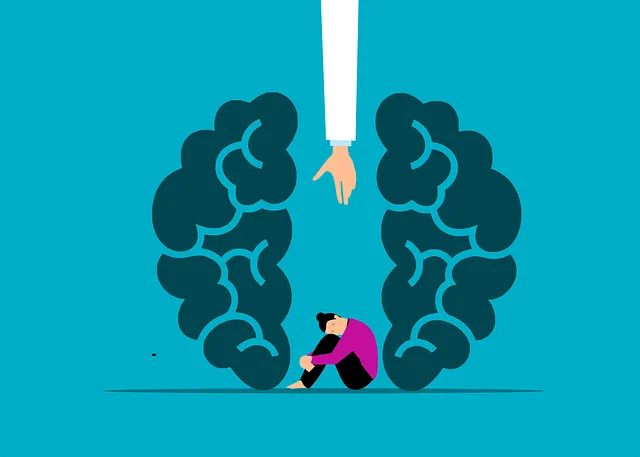The Centennial Kaiser Permanente Mental Health Appointment Center recognizes burnout as a significant issue among healthcare providers, addressing it through various programs focused on self-esteem, stress reduction, and emotional regulation. They offer workshops, support groups, counseling, and resources for coping skills development, promoting work-life balance, mental wellness coaching, and emotional intelligence training to prevent burnout and enhance patient outcomes. These proactive measures create a healthier, more sustainable work environment at the center.
“Burnout among healthcare providers is a growing concern, particularly within dedicated facilities like the Centennial Kaiser Permanente Mental Health Appointment Center. This article explores comprehensive strategies to prevent burnout, focusing on the unique challenges faced by mental health professionals in this high-pressure environment. We delve into understanding burnout, recognizing warning signs, and implementing self-care practices for optimal well-being. Additionally, we highlight the importance of fostering supportive work environments, professional development, and mindfulness to combat burnout effectively at Centennial Kaiser Permanente.”
- Understanding Burnout Among Healthcare Providers at Centennial Kaiser Permanente Mental Health Appointment Center
- Recognizing the Signs and Symptoms of Burnout
- Strategies for Effective Self-Care and Work-Life Balance
- Fostering a Supportive Work Environment at the Appointment Center
- The Role of Professional Development and Mindfulness Practices
Understanding Burnout Among Healthcare Providers at Centennial Kaiser Permanente Mental Health Appointment Center

At the Centennial Kaiser Permanente Mental Health Appointment Center, burnout among healthcare providers is a pressing concern. This issue is especially acute given the demanding nature of the work environment, where professionals constantly juggle high patient volumes, complex cases, and often, long hours. The center recognizes that burnout not only affects individual well-being but also hampers the overall quality of care delivered to patients.
To combat this, various initiatives have been implemented at Centennial Kaiser Permanente, focusing on strategies like self-esteem improvement, stress reduction methods, and emotional regulation techniques. These programs aim to empower healthcare providers with tools to manage their mental health effectively. Through workshops, support groups, and individual counseling sessions, staff members are encouraged to prioritize their well-being, fostering a healthier work-life balance. By addressing burnout proactively, the center strives to create a resilient and motivated workforce, ultimately enhancing patient outcomes.
Recognizing the Signs and Symptoms of Burnout

Burnout is a significant concern within the healthcare industry, impacting both providers’ well-being and patient care quality. Recognizing the signs and symptoms early on is vital to preventing this exhaustion. Healthcare workers often exhibit emotional exhaustion, feeling drained and unable to cope with routine tasks. They may also experience depersonalization, where they feel detached from patients and colleagues, and a reduced sense of personal accomplishment. At Centennial Kaiser Permanente’s mental health appointment center, professionals are encouraged to seek support before reaching a critical point.
Mental Health Awareness is crucial in addressing burnout. Providing healthcare providers with access to Trauma Support Services and Conflict Resolution Techniques can be transformative. These strategies help individuals manage stress, process traumatic experiences, and resolve interpersonal conflicts—all of which contribute to a healthier work environment. By recognizing the warning signs and implementing these support systems, healthcare providers can mitigate burnout risks, ensuring they remain effective in delivering quality patient care.
Strategies for Effective Self-Care and Work-Life Balance

Maintaining a healthy work-life balance is crucial for healthcare providers to prevent burnout and promote mental wellness. At Centennial Kaiser Permanente Mental Health Appointment Center, we emphasize the importance of self-care as an essential component of our burnout prevention strategies. Providers are encouraged to prioritize their own mental health and well-being through regular therapy sessions, mindfulness practices, and engaging in hobbies outside of work. Balancing professional responsibilities with personal time allows for a much-needed respite from the demands of patient care.
Coping Skills Development plays a pivotal role in achieving this balance. Our center offers resources and workshops to help healthcare providers develop effective coping strategies. From stress management techniques to setting healthy boundaries, these skills empower professionals to navigate challenging work environments while maintaining their emotional resilience. By fostering a culture that values self-care, Centennial Kaiser Permanente aims to support its staff in the long term, ensuring they can continue to deliver exceptional patient care with renewed enthusiasm and focus.
Fostering a Supportive Work Environment at the Appointment Center

At Centennial Kaiser Permanente mental health appointment centers, fostering a supportive work environment is paramount to preventing burnout among healthcare providers. This involves creating an atmosphere that encourages open communication, emotional support, and collaboration. Implementing Mental Wellness Coaching Programs Development can significantly enhance this, offering professionals opportunities to process challenging cases, share best practices, and receive guidance on maintaining their own mental wellness.
Promoting Emotional Intelligence is another key strategy. Training staff in emotional awareness and response helps them better understand and address the emotional needs of patients, reducing the emotional burden on providers. Additionally, conducting regular Risk Assessment for Mental Health Professionals can identify early signs of burnout or distress, enabling timely interventions such as adjusted schedules, additional support resources, or referrals to specialized programs. These proactive measures contribute to a healthier, more sustainable work environment at Centennial Kaiser Permanente appointment centers.
The Role of Professional Development and Mindfulness Practices

Professional development and mindfulness practices play a pivotal role in burnout prevention strategies for healthcare providers, particularly at centers like the Centennial Kaiser Permanente mental health appointment center. Engaging in ongoing learning opportunities allows professionals to stay updated with the latest research and treatment techniques, fostering a sense of growth and purpose. This continuous education can be tailored to individual interests and areas of expertise, empowering providers to address their unique challenges.
Mindfulness practices, such as meditation and stress-reduction techniques, offer healthcare workers tools to navigate the demanding nature of their work. Incorporating these practices into daily routines can enhance self-awareness, improve emotional regulation, and cultivate a sense of calm amidst the chaos. By prioritizing mental well-being, healthcare providers are better equipped to maintain cultural sensitivity in mental healthcare practice, ensuring they remain attuned to the diverse needs and experiences of their patients.
Burnout among healthcare providers is a pressing issue, but through proactive strategies, the Centennial Kaiser Permanente Mental Health Appointment Center can foster a resilient and supportive work environment. By recognizing signs early, prioritizing self-care, maintaining work-life balance, and implementing professional development programs that include mindfulness practices, the center can prevent burnout and ensure its staff remain dedicated to delivering exceptional patient care. These measures are essential for the long-term success and well-being of both the healthcare providers and the patients they serve at the Centennial Kaiser Permanente Mental Health Appointment Center.






